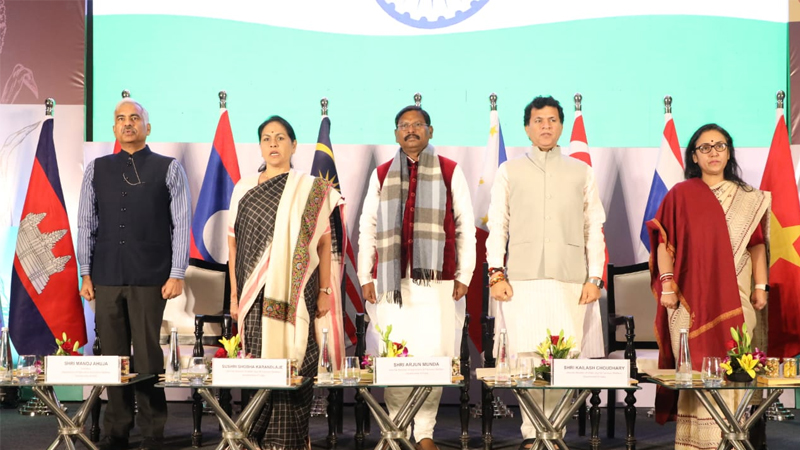Union Minister of Agriculture and Farmers’ Welfare and Tribal Affairs Shri Arjun Munda inaugurated ASEAN-India Millet Festival today at New Delhi. Ministers of States for Agriculture and Farmers’ Welfare Shri Kailash Choudhary and Sushri Shobha Karandlaje and Secretary, Department of Agriculture and Farmers’ Welfare, Shri Manoj Ahuja were also present in the occasion. In line with the International Year of Millets, the festival aims to increase awareness and establish a larger market for millet and millet based products.
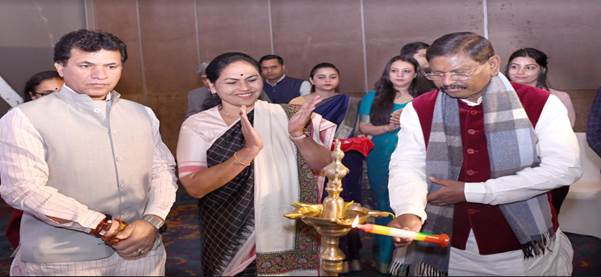
Addressing the delegates from India, Cambodia, Indonesia, Laos, Malaysia, Myanmar, Philippines, Thailand and Vietnam attending the festival, Union Minister Shri Arjun Munda highlighted the government policies and market innovations to promote the production and consumption of grains. Shri Munda said that millet provides innumerable benefits to farmers, consumers and the environment and makes an important contribution to global food-nutrition security. Highlighting the socio-economic, nutritional and climate benefits associated with its increased consumption, Shri Munda stated that this program reflects the vibrancy of millets and its immense potential in transforming agriculture and nutrition. Under the visionary leadership of Prime Minister Shri Narendra Modi, the Government of India has played an important role in organizing the mega event of International Millets Year 2023. This concerted effort transcended boundaries and transformed the event into a global milestone of unparalleled significance. Prime Minister Shri Modi’s deep understanding of sustainable agriculture and nutrition security has been the driving force behind India’s proactive progress in placing food at the forefront of the global agenda. Celebration of the International Year of Millets has been important in creating awareness about millet to ensure food security and better nutrition. This has led to investment in extension services along with research and development, which motivates stakeholders to increase the productivity, quality and associated production methods of grain. In the face of global challenges of climate change, the importance of grains increases even more. Millet is an ancient grain, the specialty of millet is that it is small, but nutritious and provides strength to the body. Millet has the power to revolutionize our approach to agriculture, climate and food security.
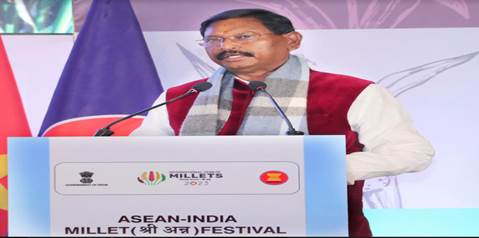
Union Minister Shri Munda said that millet is not only the bearer of a rich cultural heritage but also offers a sustainable solution that matches our current concerns. The ability of grains to address key Sustainable Development Goals, including zero hunger, good health and well-being, sustainable consumption and production, and climate action, positions it as indispensable resources for developing countries. He said that millet has the ability to thrive in diverse environments, requiring minimum resources while providing maximum nutritional benefits. Adopting millet in the diet is not just about nourishing yourself; rather, it is about nourishing the earth, promoting sustainable agricultural practices, and ensuring a healthier, more secure future for future generations. Shri Munda said that we should recognize the impact it has on our farmers, because grains are not just crops; they are a beacon of hope for our farming communities, which provides stability in uncertain climate and empowers our farmers with favorable yields and sustainable income. Known for its minimal water requirements, low carbon footprint and ability to thrive in drought conditions, buck wheat truly meets the criteria of climate friendly crops. In view of the increasing demand for vegetarian, gluten free food, millet offers alternative food systems. Millet is nature’s gift to humanity, as well as a promising source of food for a sustainable future.
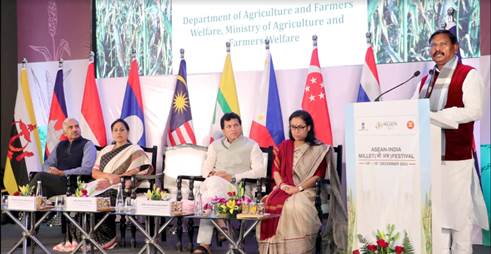
Shri Munda said that the Government of India has launched massive campaigns and positioned millet as a better solution to tackle malnutrition, mitigate the adverse effects of climate change and promote the adoption of sustainable farming practices. Ministry of Agriculture is actively implementing Millets Sub-Mission under National Food Security Mission in all the States and Union Territories to promote millets and meet the increasing demand. The Ministry of Agriculture, in collaboration with various ministries and states, has played an important role in the promotion of millets in the country. The launch of several State Millet Missions and Projects is a testimony to our commitment. The International Year of Millets has brought widespread awareness of millet and increased consumption of millet in India and on the global platform through a series of impactful initiatives and strategic commitments. Shri Arjun Munda said that our commitment is not just in words, but goes beyond this. By nominating millets as “One Country-One Priority Product” in the Food and Agriculture Organization and expanding it to “One District-One Product” in 21 districts, we have harnessed the potential of millets, their nutritional value and Economic feasibility. He said that the announcement made by Prime Minister Shri Modi during the Global Millets Conference in March 2023 regarding converting the Indian Millets Research Institute into a Global Center of Excellence for Millets is a step towards promoting millet cultivation and global research cooperation and innovation. It is a symbol of our dedication. IIMR has played an important role in setting up 25 seed hubs, 18 centers in various institutions and has developed more than 200 improved varieties of grains in collaboration with other agricultural institutions. This has ensured surplus availability of high quality cereal seeds, with the aim of increasing the annual seed replacement ratio to 10%.
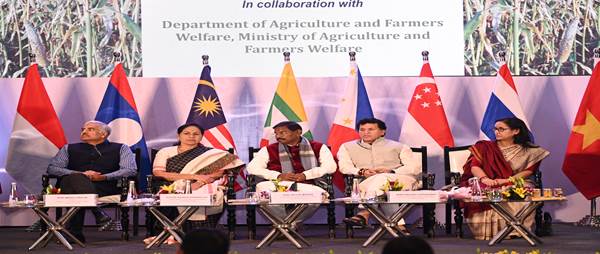
Secretary, Department of Agriculture and Farmers’ Welfare, Shri Manoj Ahuja, emphasized the festival’s significance in fostering India’s diplomatic ties with ASEAN nations for promotion and adoption of millets. During the ceremony, a short video presentation showcased the journey of International Year of Millets 2023 initiatives, emphasizing the Indian government’s interventions for enhanced millet production, usage, and accessibility.
The inaugural day featured two enlightening panel discussions, The first panel, ‘Issues of Hunger and Malnutrition in Southeast Asia – Millets as a Solution,’ moderated by Additional Secretary, Ministry of Women & Child Development, Shri Sanjeev Kumar. It brought out interesting insights on the nutritional merits of millets, its potential to address world hunger and the many ways to turn them into nutrient-packed culinary delights to fight nutritional deficiency. The second panel, titled, ‘History and Culture of Millets in Southeast Asia,’ moderated by Joint Secretary, Ministry of Culture, Ms. Lily Pandeya delved into the historical and cultural ties between the regions, emphasizing millets’ role in reviving traditional connections.
The festival will conclude on 15th December 2023. The event followed a preceding festival held in Jakarta, Indonesia from 22-26 November 2023. On day two of the festival, a Business-to-Business (B2B) meeting is organized by APEDA. This meeting is curated to serve as an interactive platform fostering engagement between businesses from India and the ASEAN member states, specifically those involved in trading millets and millet-based products. The objective is to facilitate participants in exploring synergies and commercial opportunities across geographic boundaries. This moment will be crucial for numerous startups and farmer-led organizations to assess the appeal and viability of their products for an international audience.
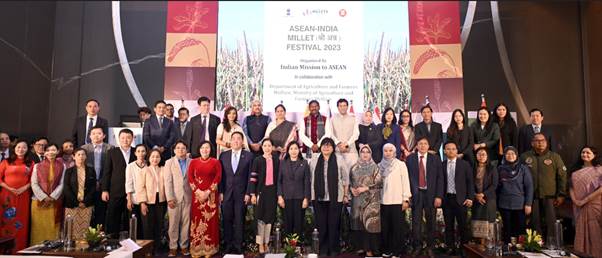
Additional Secretary Ms. Maninder Kaur and Joint Secretary Ms. Shubha Thakur welcomed the guests. In the festival, along with panel discussions on food security, business cooperation and other topics, an exhibition of millet based products has also been organized by FPOs and Startups. Policy makers, entrepreneurs, expert startups and officials from ASEAN countries including India are participating in this two-day festival organized by the Indian Mission in ASEAN in collaboration with the Ministry of Agriculture and Farmers’ Welfare.


